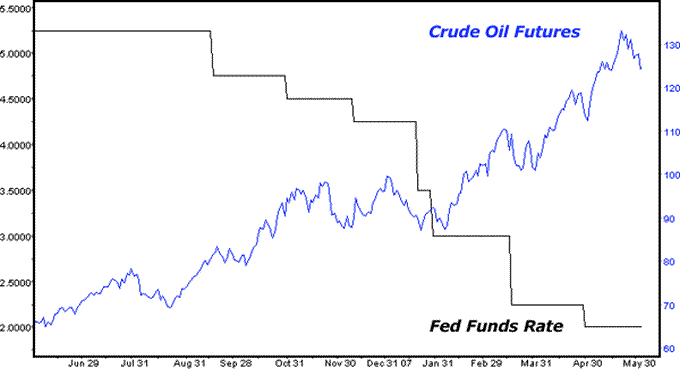Why there is Speculation in Commodities
Commodities / Resources Investing Jun 07, 2008 - 02:08 PM GMT Mike Larson writes: Congress is up in arms. And the Commodity Futures Trading Commission (CFTC) is on the warpath. Their target: Speculators in the natural resources market.
Mike Larson writes: Congress is up in arms. And the Commodity Futures Trading Commission (CFTC) is on the warpath. Their target: Speculators in the natural resources market.
The CFTC said this week that it's investigating a dramatic rise in cotton prices from earlier this year. It also plans to tighten some rules that apply to investors in the broader agricultural futures markets. Those steps come just a few days after the regulatory body said it would investigate oil trading activity to see if prices are being manipulated.
Meanwhile, the Senate Commerce, Science, and Transportation Committee just held a hearing on commodities speculation. At the gathering, legendary hedge fund manager George Soros said:
"There is a strong prima facie case against institutional investors pursuing a commodity index-buying strategy ... It is intellectually dishonest, potentially destabilizing and distinctly harmful in its economic consequences."
A gentleman by the name of Gerry Ramm, who runs an oil company in Washington, was even more blunt. He said:
"Excessive speculation on energy-trading facilities is the fuel that is driving this runaway train in crude oil prices"
 |
| George Soros, the enormously successful financier, philanthropist and bestselling author, testified before the U.S. Congress on Tuesday. |
My take? I think there have been serious fundamental forces driving the price of oil and other commodities higher in the past few years. They include strong overseas demand, booming growth in China, India, and all over Asia, a lack of investment in mining and drilling when commodity prices were low, and so on.
But you've got natural resource experts like Sean Brodrick and Larry Edelson who can tell you all about those forces. My focus today is on how fiscal and monetary policymakers have made a bad problem — at least, from the perspective of commodity CONSUMERS — much worse.
The irony here is what precipitated all this ...
The Role of the Fed and the Dollar In the Commodity Boom
Officially, we've had a strong dollar policy in the U.S. for several years. Unofficially, we've had anything but.
Treasury Secretaries, including the current one Henry Paulson, have occasionally released mealy-mouthed statements designed to give the buck a boost. But none of them had any lasting impact. The dollar has persistently declined since 2001 amid a dollar policy of benign neglect.
Now stop for a minute and put yourself in the shoes of an executive at a foreign firm that produces oil ... or copper ... or virtually any other commodity. Your commodities are priced in dollars. You're getting paid in dollars. Yet month after month, the value of those dollars is declining.
 |
| Fields of Gold: A bushel of spring wheat, which has historically traded between $3 and $7, recently spiked as high as $24. |
What are you going to do? You're going to raise your prices! You need more dollars from each sale of a barrel of oil or metric tonne of copper to compensate for the loss of the purchasing power of those dollars.
Large speculators and big money investors aren't idiots. They figured out long ago that the U.S. administration couldn't care less about the dollar. And they knew their dollars were losing purchasing power, too. So what'd they do? They started plowing money into commodities themselves. That money flow — that "asset allocation" into commodities — continues to this day.
So yes, I do believe that investors have played a role in driving prices higher. But it's the government's own fault!
The same policymakers who are whining about investors buying resources are the ones who haven't been willing to step up and take a stand to defend the dollar.
Meanwhile, on the interest rate front, the Federal Reserve embarked on a massive cutting campaign after the dot-com bust. It slashed the funds rate all the way to 1% ... and left it there for a long time. Then it raised rates so slowly that the "real" fed funds rate was negative for several quarters.
Last year, as the credit crisis started hammering the markets, the Fed obliged Wall Street once again. It aggressively slashed interest rates, driving them well below the rate of inflation.
What impact did this fresh bout of negative real rates have on commodities? Take a look at this chart showing the funds rate (black line) and the price of crude oil futures (blue line). You tell me if maybe, just maybe, this flood of "cheaper than free" money from the Fed has had a role to play in the surge in commodity prices.

The way I see it, the Fed's moves were like throwing red meat into a cage full of hungry lions. Or maybe pouring gasoline on an already-raging fire. You can pick your own favorite metaphor. But I think you catch my drift.
The Fed keeps acting surprised about the run up in commodities prices. It seems "shocked, SHOCKED!" that they have gone up. Has anyone at the Fed tried looking in the mirror recently? That's where at least part of the fault lies.
If They Want to Get Prices Under Control, They Need to Hike Interest Rates!
In sum, most of Wall Street and Washington are asking: "Are speculators driving commodity prices higher?" I think that's the wrong question. What they SHOULD be asking is: " WHY are speculators and investors pouring into the natural resources market?"
The answer is simple: Because they have both the motive (they're trying to protect themselves against the declining purchasing power of their dollars) and the means (better-than-free money, courtesy of Ben Bernanke's reckless monetary policy) to do so.
So listen up Washington: You want to stop commodity prices from going up? You want to give consumers a break at the gas pump and the grocery store? You want to punish the speculators and end this madness?
Then quit whining about those meanies in the commodities pits. Quit dinking around with margin and reporting requirements. Hike interest rates. Now! Push them a percentage point or two above the current rate of inflation (or barring that, above the expected future rate of inflation). That'll stem the flow of easy money into natural resource markets, drive the dollar higher, and cause prices to collapse.
Will that harm the economy? Will it cause some pain? Absolutely. But nobody said running the Fed was an easy job. Sometimes you have to take the politically painful path in the short term to restore long-term credibility and to keep inflation under control.
Until next time,
Mike
This investment news is brought to you by Money and Markets . Money and Markets is a free daily investment newsletter from Martin D. Weiss and Weiss Research analysts offering the latest investing news and financial insights for the stock market, including tips and advice on investing in gold, energy and oil. Dr. Weiss is a leader in the fields of investing, interest rates, financial safety and economic forecasting. To view archives or subscribe, visit http://www.moneyandmarkets.com .
Money and Markets Archive |
© 2005-2022 http://www.MarketOracle.co.uk - The Market Oracle is a FREE Daily Financial Markets Analysis & Forecasting online publication.



